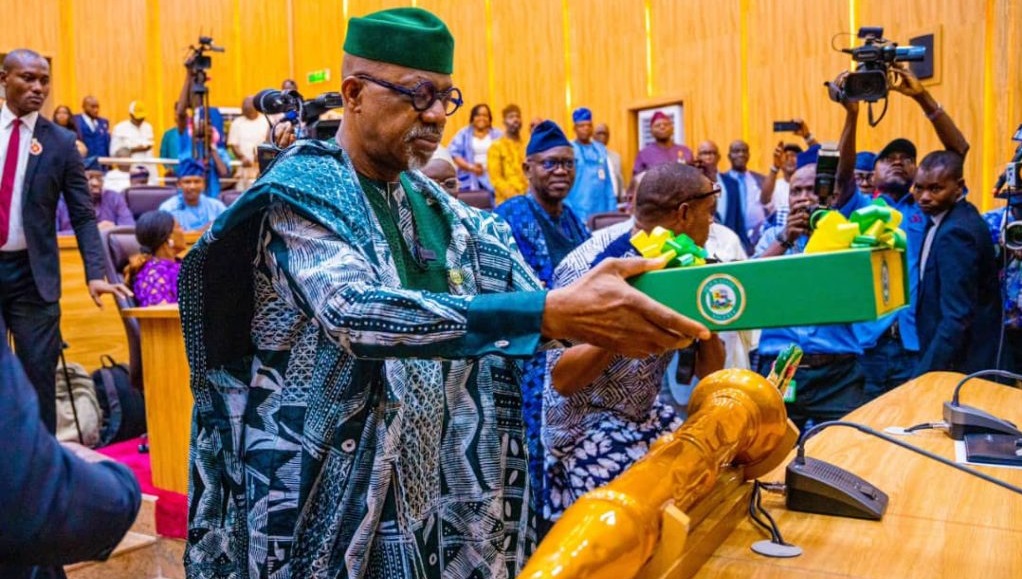Ogun State Governor, Prince Dapo Abiodun, has presented a total of N1,054,542,020,147.47 to the State House of Assembly as the State’s proposed budget for 2025.
Speaking at the Assembly’s Complex, Oke-Mosan, Abeokuta, Governor Abiodun said the budget, tagged “Budget of Hope and Prosperity,” is made up of N453.56 billion as recurrent expenditure and N600.98 billion as capital expenditures.
Giving highlights of the appropriation, the governor said N120.1 billion would go for personnel costs, N37.49 billion for consolidated revenue cost, public debt charges would gulp N76.07 billion, while N219.86 billion would be spent on overhead costs.
On some of the key physical capital projects that would be executed in the 2025 budget, Abiodun listed the renovation of general and state hospitals and the purchase of laboratory and medical equipment across the state, revitalization of 80 primary health centers, and procurement of laboratory and medical equipment across all primary health facilities in the state, as well as the construction of roads across the state.
Other projects include the procurement and energizing of transformers, construction of fire stations across the state, upgrading of rural roads across the state, extension of the Redline Metro Rail from Agbado to Kajola, Blueline Metro Rail from Okokomaiko-Agbara/Lusada, and the Purpleline Metro Rail line.
He said the government would also embark on the construction of the Ogun Lodge Government House in Abuja, rehabilitate 150 km of feeder roads across the state, construct the OGIRS Revenue House, and a modern Court of Appeal in the state.
On the funding of the 2025 budget, Governor Abiodun said an estimated N120.97 billion would come from the State Internal Revenue Service, N193.85 billion from Ministries, Departments, and Agencies (MDAs), totaling N314.82 billion.
Statutory allocations from the Federal Government, including Value Added Tax, are projected at N228.06 billion, while capital receipts comprising internal and external loans as well as grants and aids are estimated at N472.66 billion.
Giving a sectoral rundown of the budget, the governor said education would gulp N117.83 billion (17%), health N134.538 billion (13%), housing and community development N66.382 billion (6%), agriculture and industry N65.387 billion (6%), infrastructure N284.456 billion (27%), recreation, culture, and religion N25.27 billion (2%), social protection N39.836 billion (4%), general public service – executive organ N46.863 billion (4%), general public service – (financial & fiscal affairs) N42.284 billion.
He said: “We will continue to accord priority attention to the completion of ongoing projects across the ISEYA development pillars; projects with revenue potentials; projects that enhance employment generation; projects consistent with priorities articulated in the State Economic Development Plan & Strategy 2021 – 2025.
“Projects that align with the seven thematic areas contained in the Medium-Term National Development Plan 2021-2025, namely: Economic Growth and Development; Infrastructure; Public Administration (Governance, Security, and International Relations); Human Capital Development; Social Development; Regional Development; Plan Implementation, Communication, Financing, Monitoring, and Evaluation,” the governor noted.
Giving a review of the 2024 budget, Governor Abiodun said the state had achieved 79% of its pro-rated revenue target and 56% of its pro-rated expenditure target as of September 30, emphasizing that the performance over the past few years underscores the state’s fiscal reliability.
“Our internally generated revenue capacity remains commendable among sub-national entities. We will continue to leverage existing statutes to enhance revenue transparency, broaden the base, and strengthen the state’s finances without imposing additional burdens on residents,” the governor assured.
In his opening remarks, the Speaker of the House of Assembly, Rt. Hon. Oludaisi Elemide, spoke on the need to grant autonomy to the legislature, increase the running cost, provision of official vehicles for the Clerk and other officers, as well as funds for the execution of constituency projects.
He said the Assembly in the last year considered 14 bills, of which nine were passed, while 32 motions were passed into resolutions, adding that the Assembly also ensured that funds meant for projects were judiciously used by Ministries, Departments, and Agencies of government through oversight functions

